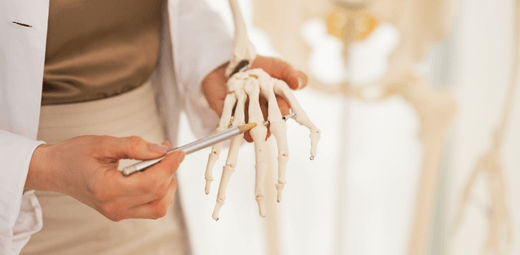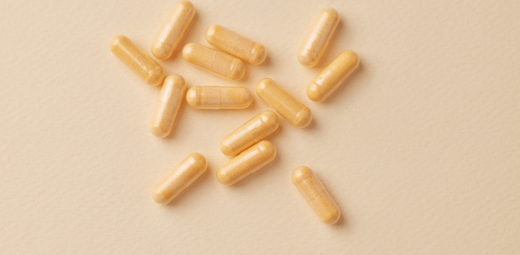Nutrition plays a vital role when it comes to supporting a healthy pregnancy. An incredible amount of change happens within the body and a range of nutrients are needed to facilitate that to ‘build’ a tiny human being from a fertilised egg.
To put it into perspective, a zygote (fertilised egg) at three weeks is a mere 0.1 millimetres in size. The average new-born is approximately 20 inches long, which equates to 508 millimetres. That’s a lot of growth in nine months.
We commonly hear about the obvious nutrition pitfalls to look out for when pregnant (folic acid and iron), but there is so much more we can do nutritionally to improve our chances of a happy healthy pregnancy.
In this article we’re going to look at nutrients responsible for foetal growth and development, as well as providing nutrient recommendations for a healthy mum! A few hacks are also going to be thrown in to help with common symptoms experienced during pregnancy….morning sickness anyone?
Preconception nutrition
Ideally, nutrition should be boosted at least three months prior to pregnancy, to provide an optimal environment for conception and to ensure that any nutrient deficiencies are addressed1.
Lifestyle factors are also key to address in the period leading up to pregnancy, to provide the best chances for conception. Stress as we all know, is on the rise with modern living contributing to a staggering rise in ongoing daily stress. Chronic long-term stress has been shown to increase inflammation and oxidative stress in the body, which hinders fertility in both men and women2.
Omega 3
DHA & EPA, which are essential omega fatty acids found in fish, nuts, seeds, and oils are key to foetal brain development and maturation. They have also been shown to help reduce allergic responses, improve infant eyesight and have even been shown to correlate with a healthy birth weight3.
There is no recommended daily dose of Omega 3 for pregnancy, however a dose of 200-300mg has shown to be safe and effective (this equates to two servings of low mercury fatty fish per week) 4.
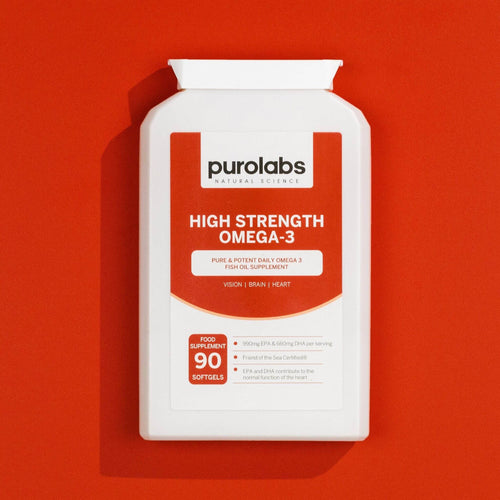
Omega-3
Choline
Choline is a nutrient that isn’t discussed very much when it comes to nutrients required during and pre-pregnancy yet is incredibly vital to foetal brain development5.
It is also involved in the methylation process along with folate to help cells grow and differentiate, which is necessary for healthy foetal development6.
You can find choline rich food sources include salmon, chicken, eggs and cocoa powder.
Folate
Folic acid, which is the synthetic form of folate, is the most common recommended pregnancy supplement, and for good reason! This nutrient is responsible for foetal neural tube growth, so is vital for brain development and nervous system support7.
UK government guidelines state that 400 µg per day of folic acid prior to conception and up until the twelfth week of pregnancy is advised8.
Our Folate supplement covers the recommended dosage requirement and is more absorbable than folic acid, ensuring that your body gets the folate that it needs to support foetal brain development and growth.
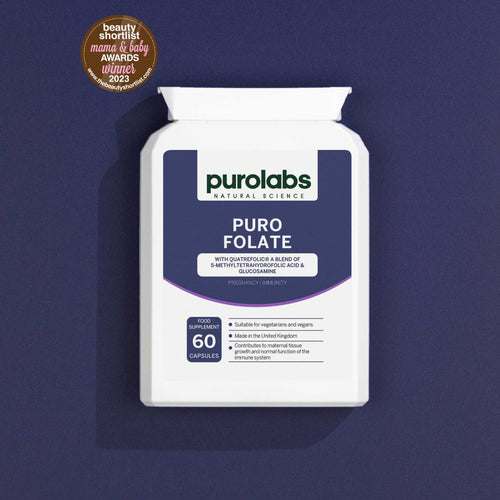
Folate
Protein
When you think of protein….think of growth. Protein is essential for healthy structural growth in all stages of life and is particularly vital during periods of quick growth, pregnancy being a time of incredible growth.
It keeps mum satiated and energised, with large demands on protein to facilitate growth. It’s important that an additional 6-10g protein daily is added to mum’s diet to meet requirements.
Add a source of protein with every meal and vary up sources to gain all the required amino acids9.
Vitamin A
Vitamin A is essential for cell differentiation and tissue growth and maintenance. It is also required for the development of the baby’s vision, hearing, immune and respiratory processes along with helping to reduce maternal and foetal anaemia10.
The UK Government states that you need an additional 70mcg of vitamin A during pregnancy to help support these vital and necessary functions11.
Vitamin D
Vitamin D is a common nutrient deficiency in pregnant women and interestingly, the foetus (and newborn) is entirely dependant on this nutrient from their mother with more demand for it during the latter part of pregnancy12.
Vitamin D also helps facilitate calcium to be utilised to help with foetal skeletal growth and helps to support immunity in both mother and baby. Ensure you are including sources of calcium in your diet to help with structural development. High calcium sources include low fat dairy, leafy green vegetables, and almonds.
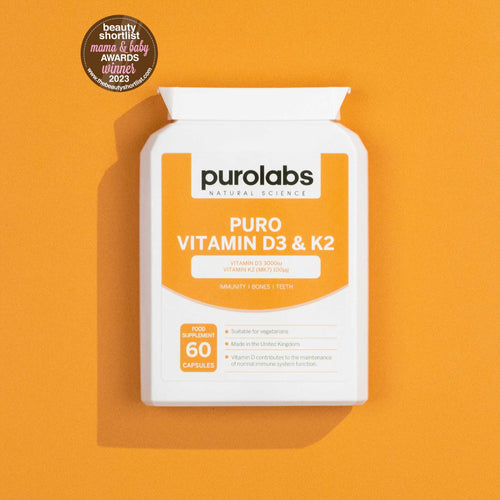
Vitamin D3 & K2
Iron
Anaemia risk increases during pregnancy13 as the body’s demands increase. Opt for an additional 500mg or iron daily during pregnancy to help expand maternal red cell mass.
Ensure that you include sources of vitamin C to help with iron absorption. Vitamin C is abundant in many fruits and vegetables with particularly high sources in bell peppers, berries, spinach, and oranges.

Iron Complex
Pregnancy symptom hacks
Most expectant mothers experience an undesirable side effect or two of pregnancy. Changes are rapidly occurring; hormones are surging and your body’s simply trying to keep up.
Morning sickness is one of the more common pregnancy symptoms. Eat small frequent high protein meals can help combat this along with ginger tea, or if you’re brave, chewing on slices of fresh ginger.
Cravings are another completely normal part of pregnancy. Zinc deficiency has been shown to increase cravings so increase your intake of pumpkin seeds, beans, and legumes. Again, keep protein intake high to increase satiety and enjoy a treat or two, you deserve it for growing a mini human being!
For constipation, a simple hack is to eat two kiwis per day, whether that be on their own or in your morning porridge or smoothie. They can help to move things along…
You can get too much of a good Thing
Supplementing large doses (over 3000 µg per day) of vitamin A can have teratogenic affects i.e. meaning it can cause foetal developmental defects. It is advised to avoid vitamin A supplementation during pregnancy unless advised by your health practitioner14 and opt for food sources of vitamin A such as butternut squash, carrots, fatty fish and fortified cereals.
High vitamin A sources like liver are best avoided during pregnancy to avoid any possibility of consuming too much vitamin A.
It's also important to avoid the following foods during pregnancy, as they carry toxins, increase the risk of infection, or have bacteria that could be harmful15:
- Pate and soft blue cheeses
- Raw eggs
- Raw fish
- Green or sprouting potatoes
- Undercooked meat
- Unwashed fruits and vegetables
If you’re concerned about getting the right condition or have a pre-existing health condition and require support, seek the help of a qualified health practitioner for peace of mind.

 Beauty
Beauty
 Bone Health
Bone Health
 Brain Health
Brain Health
 Energy
Energy
 Eye Health
Eye Health
 Gut Health
Gut Health
 Hair
Hair
 Hormonal Health
Hormonal Health
 Heart Health
Heart Health
 Immunity
Immunity
 Joints
Joints
 Menopause
Menopause
 Pregnancy
Pregnancy
 Kids
Kids
 Sleep
Sleep
 Stress & Mood
Stress & Mood

















